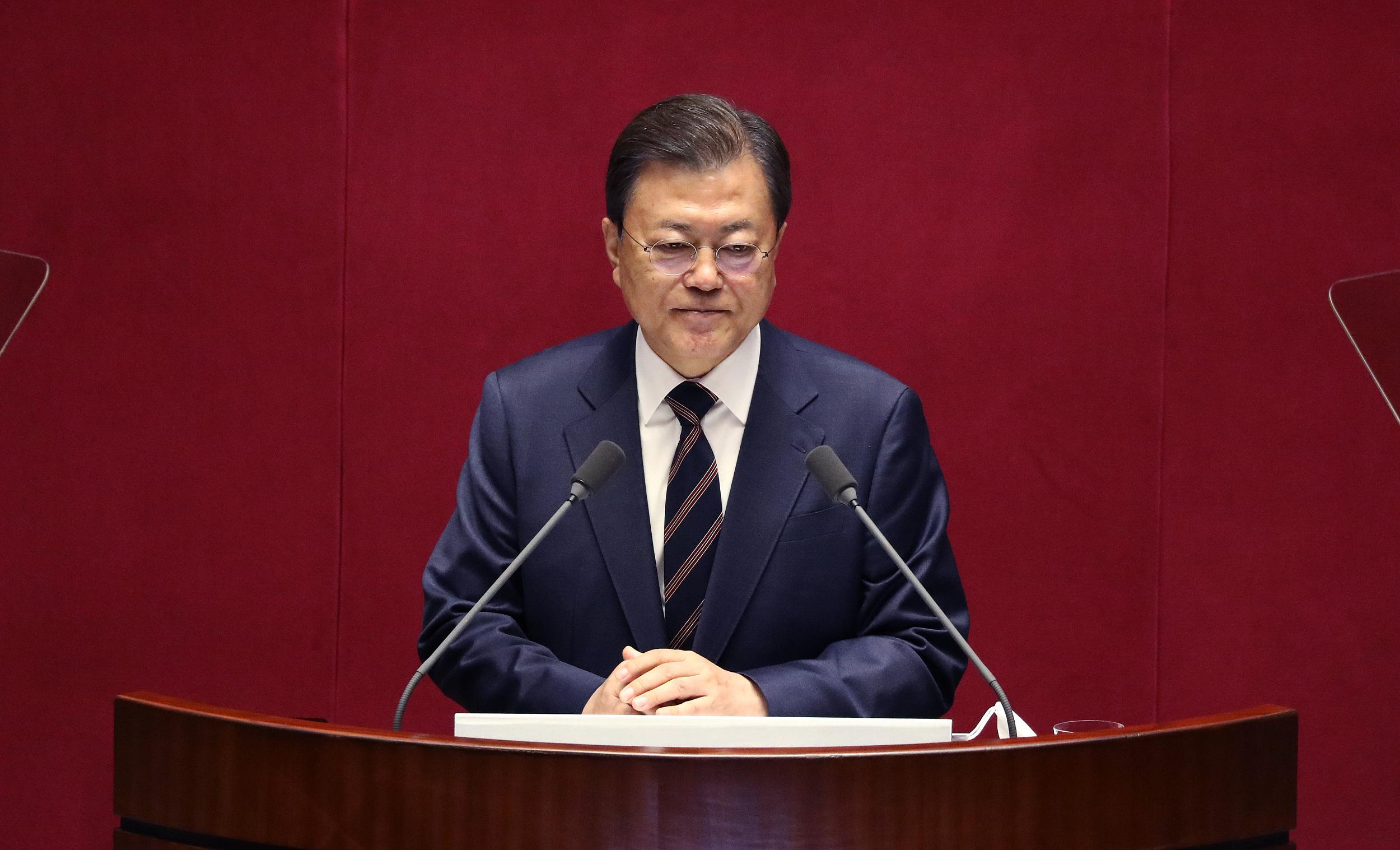South Korean president Moon Jae-in has six months left in his term of office, and on October 25, he delivered his last policy address on the 2022 budget in the South Korean Parliament, stressing that he will work hard to overcome the crisis and restore the order of South Korea's economy and life in the remaining next term.
In his policy address, Moon mentioned South Korea's low birth rate, poverty rate for the elderly, suicide rate, and high work-related injury mortality rates, and said that "this is a shameful self-portrait of South Korea." He said these are difficult problems that South Korean society has been calling for a long time ago, but progress has not been made. Moon Jae-in said that the real estate problem is still the most important livelihood issue and a topic that needs to be reformed, and the concentration of the capital region and regional imbalances are also unresolved problems.
The Hank Nationalities Daily reported that during the Moon Jae-in administration, house price instability was even more severe.
In addition, according to the Han Nationalities Daily, although Moon Jae-in did not specifically mention it, the new crown epidemic has made this shadow even stronger. In response to the impact of COVID-19, ultra-low interest rates and liquidity expansion have further exacerbated asset inequality.
Moon argues that the stumbling blocks to social cohesion in South Korea are "unfairness, discrimination, and exclusion," and that inequalities exacerbated by the COVID-19 crisis, even if defeated, do not seem to be easily eliminated. In order to give hope to the next generation, creative solutions to justice and justice should be explored more actively.
Since this was Moon's last address, it weighed differently than before. The preparation of this budget is also the last time during the term of the Moon Jae-in government, and the final budget and implementation need to be realized by the next government. Therefore, in his policy address, Moon Jae-in mainly showed the achievements and shortcomings of the policies that the current government has been promoting, as well as the aspects that hope that the next government can continue.

On the 25th, Moon Jae-in delivered his last policy address in South Korea, source: People's Vision
On the issue of the epidemic and economic recovery, Moon Jae-in said that although South Korea's COVID-19 vaccination began late, thanks to the active participation of the people, the first dose vaccination rate in South Korea exceeded 80%, and the full vaccination rate exceeded 70%. From next month, South Korea will return to normal in stages.
Moon said South Korea's economy has recovered the fastest among developed countries, employment indicators have also returned to about 99.8 percent of the level before last month's crisis, the economy has generally remained stable, and credit ratings have remained at the highest level.
However, at present, there are still many people in South Korea who have not felt the "warmth brought by economic recovery", and the South Korean government has promised to fully promote inclusive and inclusive recovery.
Moon Stressed that fiscal policy is bound to play an important role next year in order to solve these issues in economic recovery, and called on the South Korean Parliament to actively cooperate in handling next year's budget.
On climate, he said that if neglected in order to escape immediate difficulties, it would become a greater burden and should be actively involved in achieving carbon neutrality.
Regarding achieving carbon neutrality by 2050, Moon said, "It is a global issue and a major challenge to the fate of the country." "It is understandable that the industry finds this goal difficult to achieve, but the South Korean government will give its full support."
He said the supply chain restructuring is to expand the opportunities for Korean companies to enter the market, and the carbon neutrality target provides new growth drivers and jobs.
Moon also said that South Korea will regard the "hydrogen economy" as the core strategic industry of the future in the carbon neutral era, and strive to realize the dream of becoming a hydrogen power and an energy power.
Yonhap News Agency reported that the proportion of moon's speech related to peace issues on the Korean Peninsula has decreased compared with previous years, and he said it would strive to create peace and prosperity for the Korean Peninsula through dialogue and diplomatic channels.
Moon Jae-in's government has six months left in its term, and the newly elected president next March will take on these tasks. Even if each political force has different priorities for solving problems and pursues different solutions, the problems facing Korean society are unavoidable.
In addition, regarding the cultural industry, Moon Jae-in said that Korean culture such as K-POP, TV dramas, movies, games, and webcomas is going global, and the industry has become a new growth driver. He said that last year, south Korean exports of cultural products exceeded $10 billion for the first time. Its popularity is spreading to Korean beauty, Korean food and other related industries.
Regarding the launch of the self-developed carrier rocket Nuri, Moon said that the Launch of the World has been successfully launched, and as long as the last step is taken, South Korea can use the self-developed rocket to send the satellite into space.
Finally, Moon jae-in concluded his speech by expressing his gratitude to the South Korean Parliament. He said that Congress has provided a lot of help to the government in overcoming the crisis and would like to thank all members of Parliament. In the future, we will not forget our original intention and continue to fulfill our mission.